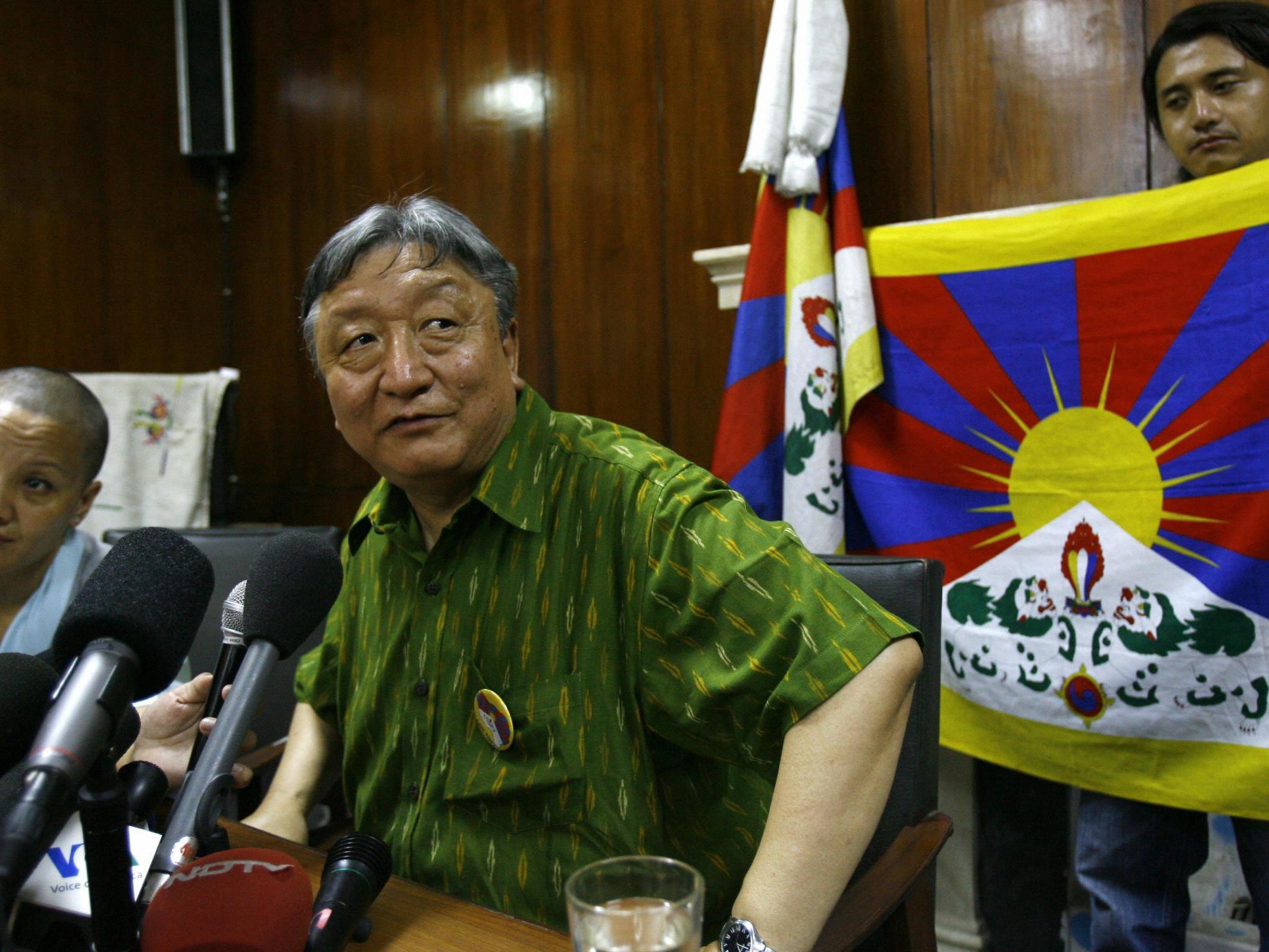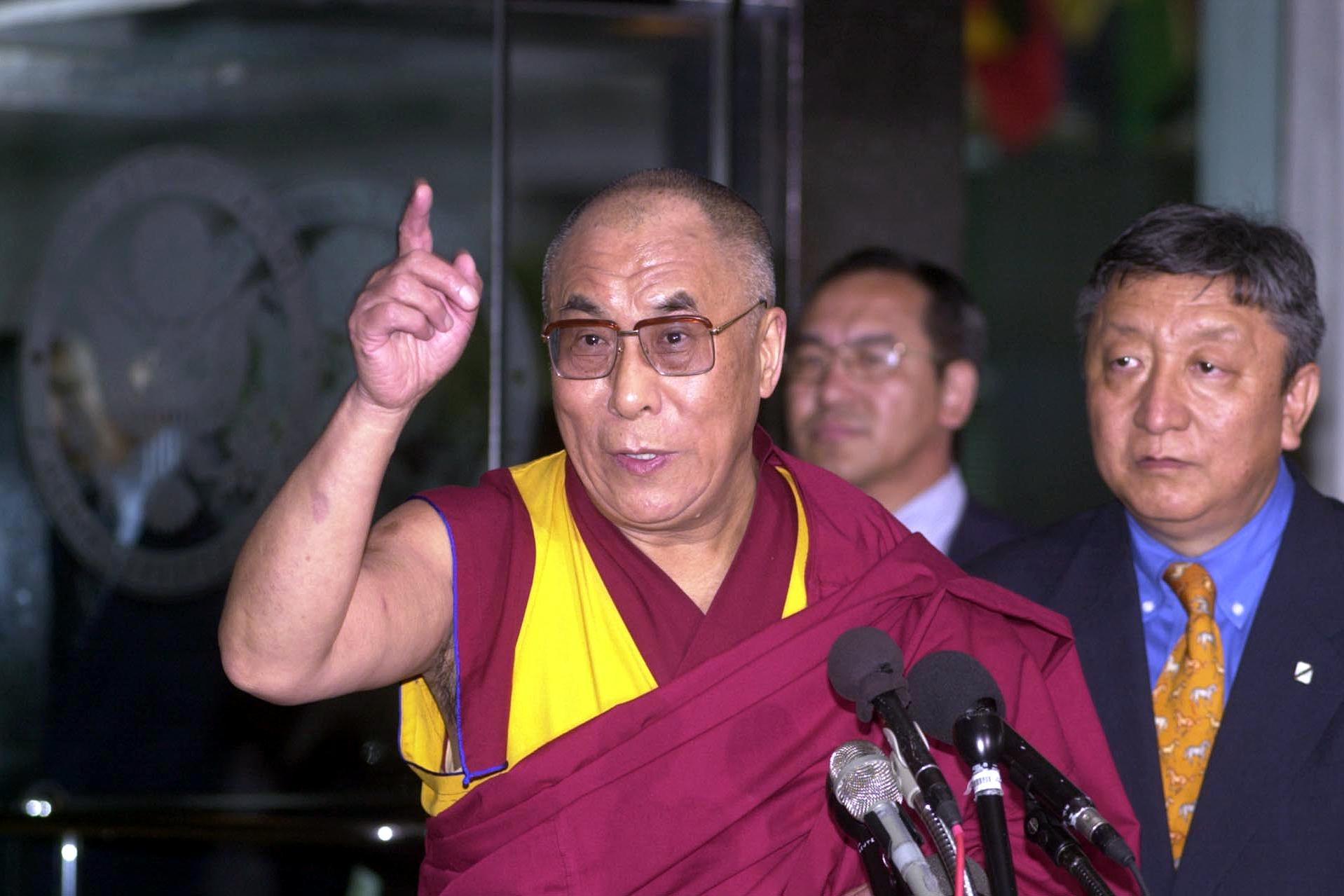The Independent's journalism is supported by our readers. When you purchase through links on our site, we may earn commission.
Lodi Gyari: ‘Reincarnated lama’ who sought political and cultural autonomy for the Tibetan people
At the age of three, Gyari began his schooling in monasteries and went on to become in effect the leading diplomat of the global Tibetan exile community and the Dalai Lama’s right-hand man

Lodi Gyari escaped Chinese oppression in Tibet as a child, then spent his life as a tireless advocate for his native land and people, becoming an emissary of the Dalai Lama in negotiations with the government of China.
Born in a tent surrounded by snowcapped mountains, Gyari (pronounced “Gary”) was descended from a long line of chieftains and resistance fighters, including his grandmother and an aunt who raised him. He was considered a reincarnated lama in the Buddhist religion and, as a child, helped guide his family out of their homeland after China seized control of Tibet in the 1950s.
He and his family fled to northern India, where many Tibetans formed an exile community in Dharamsala, under the spiritual guidance of the Dalai Lama. Gyari, who studied in monasteries in Tibet and India, was drawn from an early age – like his ancestors – to the cause of Tibetan freedom.
In 1970, he helped found the Tibetan Youth Congress, which remains the largest political organisation of Tibetans in exile. Gyari, who became a skilled English language writer and speaker, was a translator for Tibetan resistance fighters training in the United States, then became the editor of a Tibetan-language newspaper and an English-language publication, now known as the Tibetan Review.
At first, he was an advocate of complete sovereignty for Tibet, which had been an independent nation before China’s communist-led revolution of the late 1940s. He became active in the Tibetan government-in-exile in India and, at age 30, became the speaker of its parliament and later a cabinet officer.
The exile government – the Central Tibetan Administration – is not an officially recognised body, but it carries considerable moral authority in the West. Gyari became, in effect, the leading diplomat of the global Tibetan exile community.
As China tightened its control over Tibet, Gyari sought to draw attention to the plight of his people, first at the United Nations and later in Washington, where he was posted as the Dalai Lama’s special envoy in 1990.
Tempering his earlier calls for Tibetan independence, Gyari became a champion of the Dalai Lama’s more moderate “Middle Way” approach, which sought political and cultural autonomy for the Tibetan people within the framework of the Chinese constitution.
In Washington, Gyari coordinated the Dalai Lama’s visits to the United States, including meetings with several presidents. He also carried Tibet’s message to the state department and congress.
He helped secure congressional funding for the Tibetan people and their causes, totalling almost $200m from 1991 to 2011. He was also a leading advocate for the Tibetan Policy Act of 2002, which established a special coordinator for Tibetan affairs at the state department and called for a dialogue between China and representatives of the Dalai Lama.

“He was instrumental in putting Tibet at the centre of US-China relations,” said Bhuchung Tsering, vice president of the International Campaign for Tibet and a member of Gyari’s negotiating team. “I found that Mr Lodi Gyari worked steadfastly to foster the aspirations of the Dalai Lama, and he was able to do that in ways I haven’t seen in others.”
At the Dalai Lama’s request, Gyari opened discussions with Chinese officials, holding nine rounds of talks between 2002 and 2010. He considered the Chinese responses to his pleas for Tibetan self-determination to be inflexible, if not hostile.
Gyari, who was allowed to return to Tibet only under close monitoring by Chinese officials, described his homeland as “in every sense, an occupied nation, brutally occupied”.
In 2008, China imposed a deadly crackdown on a Tibetan uprising and charged the Dalai Lama with attempting to foment an insurrection.
“The more you suppress, the more the resentment,” Gyari told NPR at the time. “We can provide them legitimacy, but if and only if the Tibetans are also given the opportunity to live in dignity.”
His discussions produced few lasting results, except for greater recognition of the Tibetan language in what is called the Tibet Autonomous Region. In 2011, when the Dalai Lama yielded political authority to the democratically elected government-in-exile, Gyari resigned as special envoy.
“Far from fading away,” Gyari wrote in the South China Morning Post in 2010, “the Tibetan political movement will reinvent itself in the absence of the current, Fourteenth Dalai Lama, and become something far more complex and unmanageable in the process.”
Lodi Gyaltsen Gyari was born on 25 August 1949, in the Nyarong region of Tibet. His father was a local chieftain who was imprisoned for a time by the Chinese government.
His grandmother, Gyari Chime Dolma, was executed after fighting against Chinese warlords at the turn of the 20th century. She was later was honoured in song and became an inspiration to future generations of Tibetan freedom fighters.
At the age of three, Gyari was identified as the reincarnation of a Tibetan lama and began his schooling in monasteries. During the 1950s, his aunt – who he considered his mother because she cared for him as a child – led a group of Tibetan resistance fighters on horseback raids against Chinese forces.
In 1957, Gyari was pulled out of a monastery as his family and others began a long journey into exile. They travelled at night to escape detection by Chinese forces.
Despite his young age, Gyari was held in a position of respect because of his standing as a monk. He conducted religious rituals and “performed divinations regarding the most auspicious time to travel and recited mantras to stop the blizzards”, he wrote in the 2016 book Himalaya: Personal Stories of Grandeur, Challenge, and Hope.
“Chinese troops pursued us and I witnessed many violent gun battles,” he wrote. “On two occasions, in the darkness and through whirling snow, men riding ahead of me were shot before my eyes and crashed from their horses to the ground. We couldn’t stop, or we would all have been lost.”
He and his family crossed the Himalayas on foot. When they finally reached the border of India, Gyari had only one shoe, the other having been left behind in the mud of his homeland.
Survivors include his wife of more than 40 years, Dawa Chokyi of McLean, Virginia; six children; his mother; three sisters; four brothers; and five grandchildren.
While serving as the Dalai Lama’s special envoy, Gyari was also president of the International Campaign for Tibet from 1991 to 1999. He later was chairman of the board before being succeeded in 2014 by actor Richard Gere.
In addition to his work on behalf of Tibet, Gyari helped found the Allied Committee, which aims to draw attention to the repression of minority groups in China, including Tibetans, Uighurs and Mongolians. He was also a founder of the Unrepresented Nations and Peoples Organisation, which seeks to give a voice to ethnic minorities and stateless groups and to spread democratic principles throughout the world.
Before his death, Gyari spent time in Thailand, writing his memoirs.
“It is because of the tragic loss of the cultural identity of my people in Tibet,” he wrote in Himalaya in 2016, “that I feel there is such importance and urgency in doing whatever one can to restore it, in whatever way possible.”
Lodi Gyari, special envoy to the Dalai Lama, born 25 August 1949, died 29 October 2018
© Washington Post
Join our commenting forum
Join thought-provoking conversations, follow other Independent readers and see their replies
Comments
Bookmark popover
Removed from bookmarks